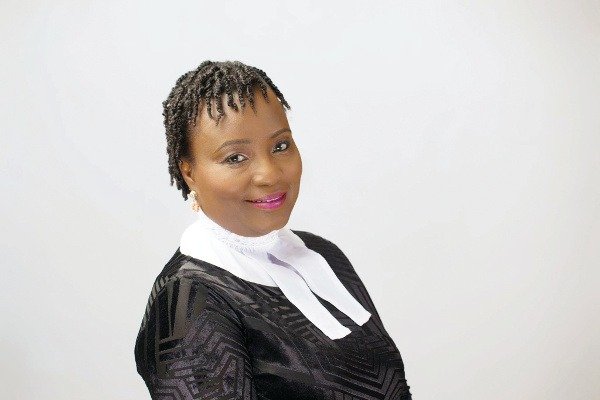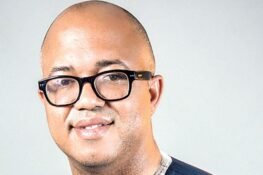An accomplished international lawyer, Ronke Omame returned to Nigeria to serve in Obasanjo’s second term. In this encounter with The Interview, she speaks about her earlier life passion and what she intends with achieve with her own brand of online legal journaling.
Have you always wanted to be a lawyer?
I was called to the Bar 37 years ago. To be honest, I didn’t really want to be a lawyer. I wanted to be a tailor; not a designer, a tailor. There was this man, Mr Layi Olumegun, called Layi the Tailor, who used to make men’s suits. I wanted to replicate that for women. When it was time to go for university, and at that time there was no JAMB – you were just asked to choose a faculty – I gave the form to my father and told him that I didn’t know. He filled law as a first choice. I went into the law faculty and really had a good time at Ahmadu Bello University. I enjoyed the subject, the moot court trials and all that. I made up my mind that I would go and practice law. I went into court daily for about 20 years. Then I had to leave Nigeria until I came back to work with President Obasanjo in his second term. Essentially, law is all I know. Today, I don’t know how to sew at all.
Very early in your career, you started your own business. What were some of the challenges you faced and how were you able to overcome them?
I try to see the best in any situation that I find myself. For example, the Muslim call to prayer in the morning wakes me up. What I do now – rather than view it as irritating, as disturbing my sleep -is to start my own prayers and start the day on an uplifting note.
Running my own business in those days took a lot of determination and persistence. I used to walk down the whole of the Marina and write down offices’ names that I would prospect for work. Some would turn out positive, others not. Those that I knew or had access to, I would follow up. I’m not sure the lawyers of today want to do that. Although, I don’t know how effective that might be today, I know that if you make the effort, it will attract work.
Also now, a lot of women are helping each other and networking. Women should speak up. Many keep quiet and I wonder why. Don’t be afraid to make mistakes. Don’t even be afraid that people will know you have made mistakes; everyone makes mistakes.
Would you say that positive discrimination in the workplace would help women as they try to forge ahead in their different careers? And should there be legal provision made for it?
Let me tell you something – thirty years ago, I did not believe in women. That’s a strange thing isn’t it? I felt that God had put us in a lower place, a place of disadvantage. Then someone mentioned about the neck controlling the head and I realised that it is true. Even in a place where we think that we are the lesser people, we should be able to direct the course of events. It is beginning to happen and if women continue to show that belief and attitude in leadership, it is bound to happen. Look at Mrs Awosika, chairman of First Bank. Twenty years ago, who would have believed that would happen?
I don’t believe that the law should concern itself with positive discrimination. I think that we should believe more in ability, capacity and personal development. There are many support groups now for women and once we are able to network among ourselves, there will follow in the uplifting of women.
You run Sisi Lawyer and are a director of Ask the Lawyer Online. How did this come about?
Sisi Lawyer is my baby. I want to separate Ask the Lawyer Online fromSisi Lawyer. The former is a limited liability company. Sisi Lawyer is me, me, me.
What Sisi Lawyer is doing is that I have been putting out information for members of the public, not necessarily directed at lawyers, unlike Ask the Lawyer Online. I find that a lot of people are afraid of the law. They are so afraid of the law that they don’t even want to know what it is or what the facts are. With the medical profession, people will ask questions. When should I take my medication? How many should I take, etc? When it comes to law, they don’t ask those questions and a lot of people get into trouble that they need not have got into. It’s easy to take advantage of people who don’t know. Sisi Lawyer has been, and is, dishing out information. There are a lot of basic things that people just don’t know.
Following my years in Abuja, I returned to Lagos and thought I wanted to do online law journaling. At that time there were only two companies doing it. My colleagues won’t like this but a lot of us lawyers don’t always like to read. While journaling might not necessarily bring in a lot of money, I felt there was a market in that.I set up Ask the Lawyer Online. Our mission is to deliver broad law resources to Nigerian lawyers principally, and lawyers abroad. We have both local and foreign subscribers. What I have learnt is that law marketing is important. I know that, traditionally, lawyers are not allowed to advertise but we need to understand the difference between advertising and marketing. Our rules of professional conduct state that once you are in practice, you can have no other business. It means then that your practice IS your business because without a business you can’t survive. So we must understand that there is a need to market our business, not necessarily by putting up billboards. That is what Ask the Lawyer is going to be doing – assisting lawyers to market, to specialise in their areas.
Sisi Lawyer is clearly depicting your gender; is that deliberate?
It is very deliberate. Although many of my friends already referred to me by that name, so it made sense from the start.
Do you find that there are more women attracted to the site?
There are more women making enquiries but I also think it is perhaps because men are more reticent in asking for help. The women are not afraid to ask seemingly stupid questions.
Is Sisi Lawyer skewed towards information on relationships?
It is actually skewed towards relationships. I recognise that there is a Law of Contract first of all. This says that there has to an offer, an acceptance and consideration and all that. It is on the basis of this that you have relationships. There are legal obligations and expectations from that.
 While still on the topic of reticence, do you find that Nigerians are reluctant to talk about making Wills?
While still on the topic of reticence, do you find that Nigerians are reluctant to talk about making Wills?
Aah, Wills. You will find that a lot of contested wills are actually those of people who should have known better. It is a shame that a lot of Nigerians, especially those who own a lot of property, do not consider making a will. They don’t always consider it as important and even those that do make wills, don’t make them properly. This is what I meant earlier about specialisation. It is not every lawyer that will know how to prepare the best Will. If you go to a lawyer who specialises in oil and gas and you decide to use his services to make your will, you can be sure that there are going to be problems. The time has come for lawyers to specialise.
Now, making of Wills and dying -it is not just a Nigerian problem. No one wants to think about dying. When I was qualifying as a UK solicitor, the lady who taught us the course about Wills actually told us that if she died that day, she would be intestate.
At the end of the day, it is very important for us to plan. We, as lawyers, have a responsibility to present it to people. However, estate planning goes beyond making a Will. Lawyers have a huge responsibility and Sisi Lawyer cannot even begin to scratch the surface.
What do you hope to achieve with Sisi Lawyer? What was the dream and where do you see Sisi Lawyer in the next five, ten years?
I expect that some lawyers will kick against it as it might be seen as an erosion of their income. I hope they will see the wisdom in providing legal information for people because the more information is widely available, the more we can provide better quality service. When you provide better quality service, there is the potential to make more money. I hope that it will be seen from that perspective. There are a lot of people who live outside the cities and do not know about legal issues. It’s about time that lawyers also reach them. A lot of lawyers are retiring to their home states and saying there’s no work there but if you have this kind of thing, there will be employment.
Sisi Lawyer is a model that can be copied by other lawyers. I don’t have any issues with my model being copied but I am particular about my brand. If other lawyers come and want to replicate the Sisi Lawyer model to serve other areas of law such as landlord and tenant, that’s a good thing.
In the next few years, I would like Sisi Lawyer to ground herself in the minds of people. I know that she is going to be a known brand and I believe that more of such brands should be developed by other lawyers. In ten years’ time, I see Sisi Lawyer as being the grandmother of such brands.
Without a personal mission, you cannot have a business. For instance, mine may be that I want to be known as a lawyer that everyone can ask questions, can rely on. It is then that I transport my personal mission into a business. This is what I want to tell the world. I want people to say in the future: that old lady, do you know her? She did this and she did that; I want to leave a legacy.
You are very active on social media, more commonly seen as a preserve of the millennials. How have you managed to embrace it?
Oh yes! That’s my latest passion. I am on Twitter and have started developing my Instagram page. As a lawyer, I thought it was all about fashion but I have recently found that you can actually disseminate information on Instagram. Much of my digital education is self-taught. You’d be surprised that I only just got on to Facebook about three years ago. I want to connect with the younger generation. I am about to start a Twitter hashtag that is going to talk about purpose.
I have been on social media since then and I’m loving it. It has helped to boost my brand.
A lot of people are surprised that, at my age, I am able to engage on social media and they salute the fact that I am not afraid to come into that space. If I want to serve young people now, it is those young people that I will be serving. I’m quite happy to be there and quite happy to tweet and the rest. I see social media as a platform that people can get to know me quickly without necessarily meeting them. It gives an opportunity to other people’s world and the ability to engage.
Do you then feel that traditional law is at risk of becoming obsolete, another victim of the Internet Age?
No, because there will always be a need for physical law resources.
Practising law in various military regimes must have come with a lot of challenges. What were some of the issues that you faced and how were you able to cope?
I was more of a young lawyer during those times. It is like when you are watching a film and it is action-packed. You couldn’t be sure what the next decree would be. By the time that you’re getting your head around one, it changes again. Some person just decided that was the way things should be done. However, it taught us as Nigerians that the time has come for us to work more on democracy. There are times when I feel that maybe a military regime would do us better even now, but I am also thankful that it’s not like that.
The president has put an anti-corruption agenda on the front burner? Would you say that this has been handled in the right way thus far?
I don’t know why there isn’t a lot of discipline in government. I don’t have the answers and I worked with government for four years. I think it is more from a feeling of being afraid of the future because why would anyone want to take the amounts of money we hear about?
Whilst it is commendable that they are trying to recover funds from the accused, I think government needs to ask themselves the reasons why people would just want to steal money like that.
I remember when I was returning from the UK to take up the government position. A Nigerian girl in my office, after she had heard, came up to me and said, “Congratulations. When you get there, please don’t forget us.” I asked her what she meant and she replied by telling me that as I was going to be at the helm of affairs, I should remember them when giving out contracts. This was a 17-year-old girl. I felt sorry for Nigeria, so unhappy for our country. This is a young girl living and working in the UK and her mentality is the one of ‘don’t forget us.’
This is why we need to make up our minds what we want to do in our country.
The profession must have changed since you were called to the Bar. What are some of those major changes?
Now you find some lawyers that cannot even speak English properly in court. I remember then going to Federal court and seeing a female lawyer outside court asking some of the lawyers why they looked so scruffy. I later found out it was Mrs Airat Balogun. Then lawyers used to train lawyers. You wouldn’t want her to catch you looking less than prepared for court.
Away from work, what are some of your other interests?
I am very adventurous. I like to learn new things. I am not necessarily going to be the best in any new thing that I learn but at least I will try it. That’s how I got into agriculture in the first place. So I now know how to plant tomatoes and vegetables.
I like to do things with my hands; I like to do craft. A friend of mine once taught me how to make beaded jewellery. I’m also looking at learning how to make home accessories and soft furnishings using different media.
I read a lot of self-development books. Not those motivational books; I’m sorry I don’t read those. I think they all say the same thing. But in everything, I try to find a good part, a positive.
If you could choose to be one person, either from history or otherwise that you wouldn’t mind being, who would it be?
Diana Ross. I have always loved her, always loved her songs. I think she is a very beautiful woman. Also, if you look at the work shedid: she contributed in setting up Motown; she brought in a lot of young, upcoming talent, people like that gave a branding to black enterprise. For that reason, I love her. I know she’s retired now. I think she did well. Even at that young age, I always felt that she was like a mother figure. Growing up, I watched every movie she was in and I liked everything about her. As far as I am concerned, she can do no wrong.








